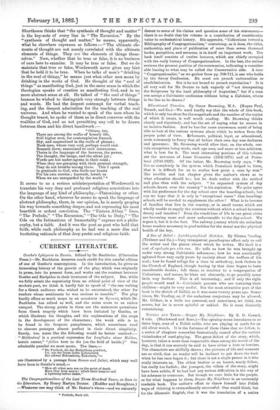Educational Theories. By Oscar Browning, M.A. (Regan Paul, Trench, and
Co.)—We need hardly say that the whole of this book, which is only too short for the magnitude and the number of the topics of which it treats, is well worth reading. Mr. Browning thinks clearly and vigoriansly, and has the art of saying what he means in an incisive fashion. And he has the more uncommon merit of being able to look at the various systems about which he writes from the proper point of view. Reformers, political, legal, or educational, seem commonly to fancy that all before their own day was darkness and ignorance. Mr. Browning would allow that, on the whole, cer- tain exceptions being made, each age sees, and more or less achieves, what is best for it. The most interesting portions of this volume are the accounts of Isaac Comenius (1592-1671) and of Pesta- lozzi (1746-1827). Of the latter, Mr. Browning truly says, "We live so completely in the system which Pestalozzi helped to form, that it is difficult for us to realise how great a man hp was." The twelfth and last chapter gives the author's views as to what education should be ; but he deals rather with the method and plan than with the subject. "An organised system of day schools drawn over the country" is his aspiration. We quite agree with his preference for the day school over the boarding-school; but can we hope that it is only in "exceptional cases" that boarding. schools will be needed to supplement the other ? What is to become of families that live in the country, or in small towns, which are wholly unable to supply the numbers without which a school becomes dreary and inactive ? Even the conditions of life in our great cities are becoming more and more unfavourable to the day-school. We regret it, but it is the fact. The railway journey which the suburban home renders necessary is good neither for the moral nor the physical health of the boy.


































 Previous page
Previous page